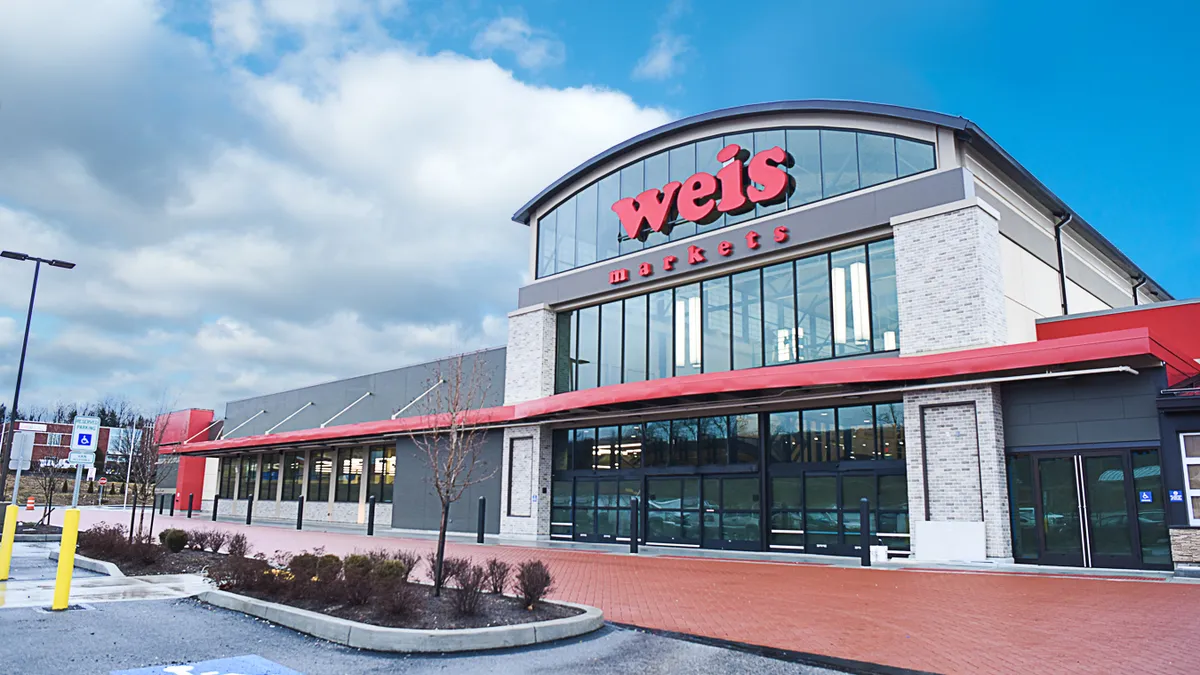Dive Brief:
- Short seller Spruce Point Capital Management has taken aim at Weis Markets, claiming the grocer’s prices are too high, that it’s losing customers to the competition and resorting to “aggressive accounting changes” to boost its financial results. A spokesman for Weis Markets did not return Food Dive’s request for comment.
- Spruce Point, which targets what it considers to be underperforming companies and stands to gain from a drop in their stock price, claims Weis has used shifting metrics to report same-store sales and failed to report the closure of three stores this year to shareholders. The firm also claims the grocer’s prices are 15% to 20% higher than its competitors, that its unique customers and average transaction size have declined year-over-year, and that the company is out of step with major industry trends like prepared foods and e-commerce.
- Yesterday, New York law firm Bronstein, Gewirtz & Grossman announced it is launching an investigation into Weis Markets and whether the company and its executives violated federal securities laws.
Dive Insight:
Spruce Point stands to gain from a decline in Weis Market’s stock price, so its report should be considered in that light. But the short seller's accusations paint a pretty unflattering picture of the grocer, and may pressure it to respond.
In an interview earlier this year with Yahoo Finance, Spruce Point’s founder and chief investment officer Ben Axler said the firm focuses on companies above $1 billion in market cap that are seeing declining sales but using creative accounting practices and acquisitions to make results appear better than they are. Spruce Point recently took aim at space technology company Maxar Technologies, with the company’s stock price falling nearly 20% since the firm issued its report. In the food industry, Spruce Point has issued reports on Tootsie Roll Industries in 2017 and Boulder Brands in 2013.
Weis Markets’ stock price dipped 5% on Wednesday following the report’s release.
The firm claims that “aggressive” accounting practices, including inconsistent metrics to determine same-store sales, have inflated Weis’ sales results. It also claims Weis makes too few disclosures — the retailer doesn’t hold quarterly conference calls, for one — for a publicly traded company, and failed to report the closure of three stores this year to shareholders.
For its part, Weis has rolled out online ordering to more than 80 stores and earlier this year announced $101 million in capital investments. In this year’s second financial quarter, the grocer reported total sales of $871 million. Net income increased 3.4% to $19.1 million while same-store sales dropped 0.3%.
Weis has been on a steep growth trajectory in recent years. In 2016, it expanded its store count 20% by acquiring stores from Food Lion and Mars Foods. Last year, it opened a few new stores and remodeled 14. It also unveiled an upscale concept store in Enola, Pennsylvania, that offered an expanded lineup of specialty products and service stations.
But Spruce Capital isn’t too high on these moves, noting that the retailer lags competitors on important industry trends, including e-commerce, prepared foods and marketing to young consumers. Weis is overpriced, according to the firm, and is losing customers to competitors like Whole Foods, Wegmans, Aldi and Lidl.
Supermarkets, and particularly conventional ones, are under considerable pressure to update their stores and invest in innovations like e-commerce to better compete in an oversaturated industry. Activist investors have gotten involved, and the criticism leveled against Weis echoes accusations brought against Ingles, Supervalu and, before it was sold to Amazon, Whole Foods.
Blackwells Capital, which sparred with Supervalu over its retail portfolio, and Jana Partners, which locked horns with Whole Foods last year, both profited handsomely from their work. As competition increases and takes on a new dimension in the e-commerce age, activist firms may feel emboldened to take aim at the crowded and ever-shifting grocery channel.









